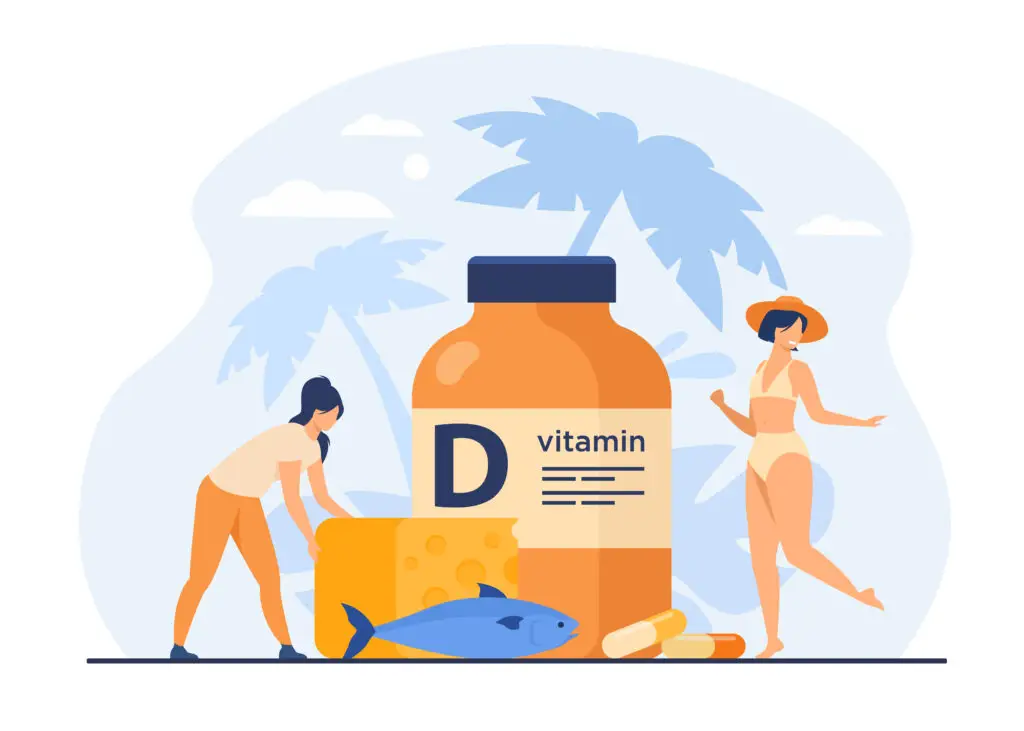Vitamin D is an essential nutrient that plays a huge role in your overall health. It’s called a “vitamin,” but it behaves more like a hormone in your body, helping regulate important functions like bone health, immune system support, and much more. Let’s break it down in a way that’s easy to understand!
Why Is It Called “Vitamin D”?
The reason Vitamin D is called a “vitamin” is because it was originally discovered as a substance that helped prevent rickets (a bone disease in children). But over time, scientists realized it does much more than that! It’s involved in several important body processes like:
- Absorbing calcium to keep your bones strong
- Supporting the immune system to fight off illnesses
- Helping with mood regulation, including preventing depression
Read more here: How do i overcome depression?
Types of Vitamin D
There are several types of Vitamin D, but don’t worry, we’ll keep it simple:
Vitamin D2 (Ergocalciferol)
- Source: Mostly from plants (e.g., mushrooms) and fortified foods (like cereals or plant-based milks).
- It’s effective, but not as powerful as Vitamin D3.
- Where to Find: Fortified foods like soy milk, almond milk, and some cereals.
Vitamin D3 (Cholecalciferol)
- Source: Made naturally by your skin when exposed to sunlight. It’s also found in animal-based foods like fatty fish, eggs, and liver.
- This is the strongest and most effective form of Vitamin D your body uses.
- Where to Find: The sun, fatty fish (like salmon), egg yolks, liver, and fortified dairy products.
Vitamin D4 (22-Dihydroergocalciferol)
- Source: Found in some mushrooms and yeast.
- It’s not commonly used in supplements and still under research.
Vitamin D5 (Sitocalciferol)
- Source: Found in plant-based sources, especially mushrooms and lichens.
- Like D4, it’s not widely used and isn’t found in most supplements.
How Does Vitamin D Benefit You?
Now that you know the different types of Vitamin D, here’s why they’re so important for your body:
- Bone Health: Vitamin D helps your body absorb calcium, which keeps your bones strong and healthy.
- Immune System: It boosts your immune system, helping you fight off infections and illnesses.
- Mood Regulation: Studies suggest that Vitamin D can play a role in preventing depression and helping with mental well-being.
- Muscle Strength: It supports muscle function, so you can move and feel better every day!
Where Can You Get Vitamin D?
Let’s talk about where you can naturally get Vitamin D and where you might want to use supplements:
1. Natural Sources: The Sun
The sun is your best friend when it comes to Vitamin D! When your skin is exposed to sunlight, your body naturally produces Vitamin D3. Just 10 to 30 minutes of sun exposure a few times a week can give you a healthy dose of Vitamin D.
2. Foods That Contain Vitamin D
Vitamin D2 (found in plant-based foods like mushrooms):
- Mushrooms (especially those exposed to UV light)
- Fortified foods like plant-based milks (soy, almond) and cereals
Vitamin D3 (found in animal products and sunlight):
- Fatty Fish: Salmon, mackerel, sardines
- Egg Yolks: Whole eggs
- Liver: Beef liver and other organ meats
- Fortified Dairy: Milk, cheese, and yogurt
- Fortified Juices: Some brands of orange juice are fortified with Vitamin D3
3. Supplements
If you’re not getting enough Vitamin D from sunlight or food, you can take supplements. Here’s a quick guide:
- Vitamin D2: Usually found in plant-based or vegan supplements.
- Vitamin D3: The most common and effective form in supplements. You’ll find it in almost every Vitamin D supplement, and it’s the one you’ll want to choose for optimal health.
How Much Vitamin D Should You Get?
Here’s a general guideline for daily Vitamin D intake, but remember, it’s always best to consult with a healthcare provider for personalized recommendations:
- Infants (0-12 months): 400 IU
- Children (1-18 years): 600 IU
- Adults (19-70 years): 600-800 IU
- Adults (70+ years): 800 IU
- Pregnant and Breastfeeding Women: 600 IU
If you’re not getting enough Vitamin D, your doctor may recommend supplements to reach the desired level.
Also read: 8 Tips on daily routine for better health



